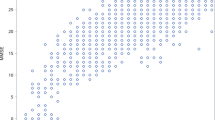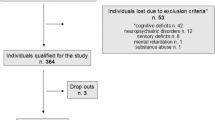Abstract
The mini-mental state examination (MMSE) has been widely used as a screening instrument for cognitive disorders. Age, schooling and many other sociodemographic and health variables may be associated with a worse performance on the MMSE. The objectives of this study were to investigate the distribution of MMSE percentiles in a large Brazilian community-based elderly sample, divided according to age and schooling, and to evaluate the impact of sociodemographic and health variables on groups of elderly people with lower cognitive performance. The MMSE was applied to a sample of 2,708 adults, aged 60 years and older. Of this population, 1,563 individuals were living in the city of São Paulo, while 1,145 were living in the city of Ribeirão Preto. The subjects were divided into six groups according to the amount of schooling that they had received (no formal education, 1–4 and ≥5 years) and age (<75 and ≥75 years old). To each one of the subgroups a stepwise logistic regression was applied, considering the following dependent variable: subjects who scored under or above the 15th percentile on MMSE. High scores on a depression scale, high scores on a memory complaints scale and low socio-economic levels were associated with poorer performance on the MMSE. Being currently employed and being married were related to higher scores on the test. Many sociodemographic and health variables can influence MMSE performance, with impacts depending on age and schooling. Clinicians and primary care physicians should pay attention to variables that may be associated with worse cognitive performance.
Similar content being viewed by others
References
ABIPEME—Critério de Classificação Econômica Brasil [ABEP Web site] (2000) Dados com base no Levantamento Sócio Econômico (2000) IBOPE. http://www.abep.org/codigosguias/ABEP_CCEB.pdf
Acevedo A, Loewentein DA, Agrón J, Duara R (2007) Influence of sociodemographic variables on neuropsychological test performance in Spanish-speaking older adults. J Clin Exp Neuropsychol 29(5):530–544
Andersen K, Lolk A, Nielsen H, Andersen J, Olsen C, Kragh-Sorensen P (1997) Prevalence of very mild to severe dementia in Denmark. Acta Neurol Scand 96(2):82–87
Anderson TM, Sachdev PS, Brodaty H, Trollor J, Andrews G (2007) Effects of sociodemographic and health variables on mini-mental state exam scores in older Australians. Am J Geriatr Psychiatry 15(6):467–476
Andrade L, Walters EE, Gentil V, Laurenti R (2002) Prevalence of ICD-10 mental disorders in a catchment area in the city of São Paulo, Brazil. Soc Psychiatry Psychiatr Epidemiol 37:316–325
Barcelos-Ferreira R, Pinto JA Jr, Nakano EY, Steffens DC, Litvoc J, Bottino CM (2009) Clinically significant depressive symptoms and associated factors in a community sample of elderly subjects from Sao Paulo, Brazil. Am J Geriatr Psychiatry 17(7):582–590
Bleeckr ML, Bolla-Wilson K, Kawas C, Agnew J (1988) Age-specific norms for the Mini-Mental State Exam. Neurology 38:1565–1568
Bottino CMC, Almeida OP, Tamai S, OV Forlenza, MZ Scalco, IAM Carvalho (1999) Entrevista estruturada para diagnóstico de transtornos mentais em idosos (CAMDEX) The Cambridge examination for mental disorders of the elderly. Brazilian version (translated and adapted on behalf of the editors, Cambridge University Press), São Paulo
Bravo G, Hebert R (1997) Age and education specific reference values for the mini-mental and modified mini-mental state examinations derived from a non-demented elderly population. Int J Geriatric Psychiatry 12:1008–1018
Brayne C, Calloway P (1990) The case identification of dementia in the community: a comparison of methods. Int J Ger Psychiatry 5:309–316
Brucki SMD, Nitrini R, Caramelli P, Bertolucci PHF, Okamoto IH (2003) Sugestões para o uso do Mini-Exame do Estado Mental no Brasil. Arq Neuropsiquiatr 61(3-B):777–781
Callahan CM, Hendrie HC, Tierney WM (1995) Documentation and evaluation of cognitive impairment in elderly primary care patients. Ann Intern Med 122(6):422–429
Caramelli P, Herrera E Jr, Nitrini R (1999) The Mini-State Examination and the diagnosis of dementia in illiterate elderly. Arq Neuropsiquiatr 57(Suppl 1):S7
Carvalho JAM, Garcia RA (2003) O envelhecimento da população brasileira: um enfoque demográfico. Cad Saúde Pública 19(3):725–733
Castro-Costa E, Fuzikawa C, Uchoa E et al (2008) Norms for the mini-mental state examination adjustment of the cut-off point in population–based studies (evidences from the Bambuí Health Aging Study). Arq Neuropsiquiatr 66(3):524–528
Chen P, Ganguli M, Mulsant BH et al (1999) The temporal relationship between depressive symptoms and dementia. A community based prospective study. Arch Gen Psychiatry 40:922–935
Chin A, O’Connell H, Kirby M, Denihan A (2006) Int J Geriatr Psychiatry 21:1150–1155
Clarnette RM, Almeida OP, Forstl H et al (2001) Clinical characteristics of individuals with subjective memory loss in Western Australia: results from a cross-sectional survey. Int J Geriatr Psychiatry 16:168–174
Coulson I, Strang V, Marino R, Minichiello V (2004) Knowledge and lifestyle behaviours of healthy older adults related to modifying the onset of vascular dementia. Arch Gerontol Geriatr 39:43–58
Crowe M, Andel R, Wadley V et al (2006) Subjective cognitive function and decline among older adults with psychometrically defined amnestic MCI. Int J Geriatr Psychiatry 21:1187–1192
Crum R, Anthony JC, Basset SS, Folstein MF (1993) Population-based norms for the mini-mental state examination by age and educational level. JAMA 269(18):2386–2391
Evans DA, Hebert LE, Beckett LA et al (1997) Education and other measures of socioeconomic status and risk of incident Alzheimer disease in a defined population of older persons. Arch Neurol 54:1399–1405
Folstein M, Anthony JC, Parhad I, Duffy B, Gruenberg EM (1985) The meaning of cognitive impairment in the elderly. J Am Geriatr Soc 33:228–235
Folstein ME, Folstein SE, McHugh PR (1975) “Mini-Mental State”: a practical method for grading the cognitive state of patients for the clinician. J Psychiatr Res 12:189–198
Fratiglioni L, Paillard-Borg S, Winblad B (2004) An active and socially integrated lifestyle in late life might protect against dementia. Lancet Neurol 3:343–353
Ganguli M, Du Y, Dodge HH et al (2006) Depressive symptoms and cognitive decline in late life. A prospective epidemiological study. Arch Gen Psychiatry 63:153–160
Henderson AS, Jorm AF, Mackinnon A, Christensen H, Scott LR, Korten AE, Doyle C (1994) A survey of dementia in the Canberra population: experience with ICD-10 and DSM-III-R criteria. Psychol Med 24:473–482
Herrera E Jr, Caramelli P, Silveira AS, Nitrini R (2002) Epidemiologic survey of dementia in a community-dwelling Brazilian population. Alzheimer Dis Assoc Disord 16(2):103–108
Hototian SR, Lopes MA, Azevedo D Jr, Tatcsh M, Bazzarella MC, Bustamante SEZ, Litvoc J, Bottino CM (2008) Prevalence of cognitive and functional impairment in a community sample from São Paulo, Brazil. Dement Geriatr Cogn Disord 25(2):135–143
Instituto Brasileiro de Geografia e Estatística (IBGE) (2002) Perfil dos Idosos Responsáveis pelos Domicílios no Brasil 2000. IBGE, Rio de Janeiro, Brasil, n. 9, pp 1–97
Inzelberg R, Schechtman E, Abuful A, Masarwa M, Mazarib A, Stugatsky R, Farrer LA, Green RC, Friedland P (2007) Education effects on cognitive function in a healthy aged Arab population. Inter Psychogeriatr 19(3):593–603
Jones RN, Gallo JJ (2001) Education bias in the mini-mental state examination. Int Psychogeriatr 13(3):299–310
Jonker C, Geerlings MI, Schmand B (2000) Are memory complaints predictive for dementia? A review of clinical and population based studies. Int J Geriatr Psychiatry 15:983–991
Laks J, Baptista EMR, Coutino ALB, de Paula EO, Engelhardt E (2007) Mini-mental state examination norms in a community-dwelling sample of elderly with low schooling in Brazil. Cad Saúde Pública 23(2):315–319
Laks J, Batista EMR, Guilherme ERL, Coutinho ALB, Faria MEV, Figueira I, Engelhardt E (2003) O Mini Exame do Estado Mental em Idosos de uma Comunidade–Dados parciais de Santo Antônio de Pádua, Rio de Janeiro. Arq Neuropsiquiatr 61(3):782–785
Lavery LL, Lu S, Chang CH et al (2007) Cognitive assessment of older primary care patients with and without memory complaints. J Gen Intern Med 22(7):949–954
Lopes MA, Hototian SR, Bustamante SEZ, Azevedo D, Tatsch M, Bazzarella MC, Litvoc J, Bottino CM (2007) Prevalence of cognitive and functional impairment in a community sample in Ribeirão Preto, Brazil. Int J Geriatr Psychiatry 22:770–776
Lopponen M, Raiha I, Isoaho R, Vahlberg T, Kivela SL (2003) Diagnosing cognitive impairment and dementia in primary health care—a more active approach is needed. Age Ageing 32:606–612
Ng TP, Chiam PC, Kua EH (2007) Ethnic and educational differences in cognitive test performance on mini-mental state examination in Asians. Am J Geriatr Psychiatry 15(2):130–139
O’Bryant SE, Humphreys JD, Smith GE et al (2008) Detecting dementia with the mini-mental state examination in highly educated individuals. Arch Neurol 65(7):963–967
Palloni A, Pinto-Aguirre G, Pelaez M (2002) Demographic and health conditions of ageing in Latin America and the Caribbean. Int J Epidemiol 31:762–771
Riedel-Heller SG, Matschinger H, Schork A et al (1999) Do memory complaints indicate the presence of cognitive impairment? Results of a Field Study. Eur Arch Psychiatry Clin Neurosci 249:197–204
Scazufca M, Almeida OP, Vallada HP, Tasse WA, Menezes PR (2009) Limitations of the mini-mental state examination for screening dementia in a community with low socioeconomic status: results from the Sao Paulo Ageing & Health Study. Eur Arch Psychiatry Clin Neurosci 259(1):8–15
Sinclair AJ, Girling AJ, Bayer AJ (2000) Cognitive dysfunction in older subjects with diabetes mellitus: impact on diabetes self-management and use of care services. Diabetes Res Clin Pract 50:203–212
The Medical Research Council Cognitive Function and Ageing Study (2000) Survey into health problems of elderly people: a comparison of self-report with proxy information. Int J Epidemiol 29(4):684–697
Valle EA, Castro-Costa E, Firmo JO, Uchoa E, Lima-Costa MF (2009) A population-based study on factors associated with performance on the mini-mental state examination in the elderly: the Bambuí Study. Cad Saude Publica 25(4):918–926
Wood RY, Giuliano KK, Bignell CU, Pritham WW (2006) Assessing cognitive ability in research: use of MMSE with minority populations and elderly adults with low education levels. J Gerontol Nurs 32(4):45–54
Yamada M, Sasaki H, Mimori Y, Yamada M, Sasaki H, Mimori Y, Kasagi F, Sudoh S, Ikeda J, Hosoda Y, Nakamura S, Kodama K (1999) Prevalence and risks of dementia in the Japanese population: RERF’s adult health study Hiroshima subjects. Radiation Effects Research Foundation. J Am Geriatr Soc 47:189–195
Yesavage JA, Brink TL, Rose TL et al (1983) Development and validation of a geriatric depression screening scale: a preliminary report. J Psychiatr 17:37–49
Acknowledgments
We would like thank the elderly adults from São Paulo and Ribeirão Preto who agreed to participate in this research. This study was supported by “Fundação de Apoio à Pesquisa do Estado de São Paulo” (FAPESP), Grant no. 01/05959-7.
Author information
Authors and Affiliations
Corresponding author
Rights and permissions
About this article
Cite this article
Moraes, C., Pinto, J.A., Lopes, M.A. et al. Impact of sociodemographic and health variables on mini-mental state examination in a community-based sample of older people. Eur Arch Psychiatry Clin Neurosci 260, 535–542 (2010). https://doi.org/10.1007/s00406-010-0104-3
Received:
Accepted:
Published:
Issue Date:
DOI: https://doi.org/10.1007/s00406-010-0104-3




